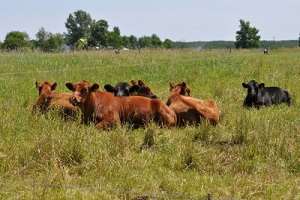By Katherine Lee
Michigan State University (MSU) will host its second annual Agriculture Innovation Day: Focus on Forages and the Future on Aug. 24 at the Lake City Research Center located at 5401 W. Jennings Road, Lake City, MI, 49651.

The educational field day will deliver a cutting-edge, in-depth look at forages, livestock and the future to help farmers meet growing producer demands.
“Forage production plays a crucial role for livestock farmers across the state,” said Ron Bates, director of agriculture and agribusiness for MSU Extension. “This field day puts farmers in front of the leading experts, the latest research and the practical demonstrations they need to improve their bottom line with new strategies that also improve or protect the environment and allow producers to market to new consumer demands.”
In addition, attendees will hear from MSU President Lou Anna K. Simon over dinner.
Throughout the afternoon and evening, farmers will have the opportunity to participate in nine sessions focused on:
- Making the Most of Reduced-lignin Alfalfa in Your Operation. Learn about the latest in reduced-lignin alfalfa genetics and results from a multiyear MSU study. Explore the differences in yield, quality and harvest timing, and what fits best for your operation and forage quality needs.
- Precision is the Division in Silage. Hear from Brian Luck, University of Wisconsin Extension specialist in biosystems engineering, as he shares the latest on a mobile app designed to help producers and custom harvesters view images of processed kernels, particle size and distribution. He will explain how combining this with moisture and starch value data allows producers to use the right equipment adjustments to make the best silage possible.
- Expand Your Use with Double-cropping. Extending your crop rotation to include cover crops can increase feed harvested per acre and extend the land base for manure application. Learn how double-cropping can provide an extra forage crop for heifers, open windows of opportunity for manure application, trap manure nutrients and remove more phosphorus from the system to virtually expand your land base.
- Precision Dairy Cattle Monitoring. Do you have a Fitbit fitness tracker? Do your cows? Come learn how researchers and producers are using wearable technologies similar to Fitbit to monitor behavior, health and reproduction for each cow in their herd 24/7. Experts will discuss each technology and how or if it fits with various management styles, and when or if it makes economic sense.
- Finding the Right Mix for Soil Health. Healthy soils are an essential for food and feed production. What we grow can improve our soils and ultimately our bottom line. Experts will look at how forage crop selection, crop rotations, cover crops and manure can affect the productivity of the soil and improve soil health.
- Baleage Made Tight, Made Right. Take a look underneath the plastic wrap and see what is happening to the forage from a feed analysis and fermentation perspective. Explore proper moisture ranges, wrapping methods and techniques for ensuring a quality product so producers can improve their dairy and beef production.
- Creating Profitable Beef Operations by Managing Land, Livestock and People. Burke Teichert, past manager of the Deseret Land and Cattle Company, one of the largest beef cattle enterprises in the United States, a current beef ranch consultant and featured columnist for Beef Today magazine, will speak on the critical factors of blending land, cattle and people to be successful in today’s beef farming environment.
- Grass-fed Beef – Research and Experience. The MSU Lake City Research Center is a leading research center on grass-fed beef production. See the results from the five-year grass-fed beef study completed at Lake City and hear from John Nelson of Midland about his experiences in switching from cash crop to grass-fed beef and how this research has helped his bottom line and increased markets for his products.
- Is Your Land Regenerating? The Land-to-Market Program Provides the Answer. The Savory Institute’s Land-to-Market program, with partners such as Michigan State University, is working to provide beef, sheep and dairy producers a process to verify that the land they are raising their livestock on is improving in well-defined quality indicators. This regeneration effort creates an opportunity for certified farms to reach new consumers who are concerned about how their food is produced. Learn the basics of the program, timelines for implementation and opportunities for participation.
“We are excited to bring new topics and in-depth discussion on forages and livestock in place of our traditional field day this year to not only expand knowledge of producers but to also make more people aware of the research and education taking place at the Lake City Research Center,” said Doug Carmichael, manager of the center. “These sessions will give farmers what they need to be successful environmentally, economically and socially.”
MSU recruiters will be on hand to provide students with information about all of the degrees available through the College of Agriculture and Natural Resources.
MSU Agriculture Innovation Day is an annual event focusing on in-depth education on critical topics. The event rotates to various locations throughout the state to give farmers access to experts who can help them improve their businesses while maintaining environmentally sound practices on their farms.
Source: msu.edu